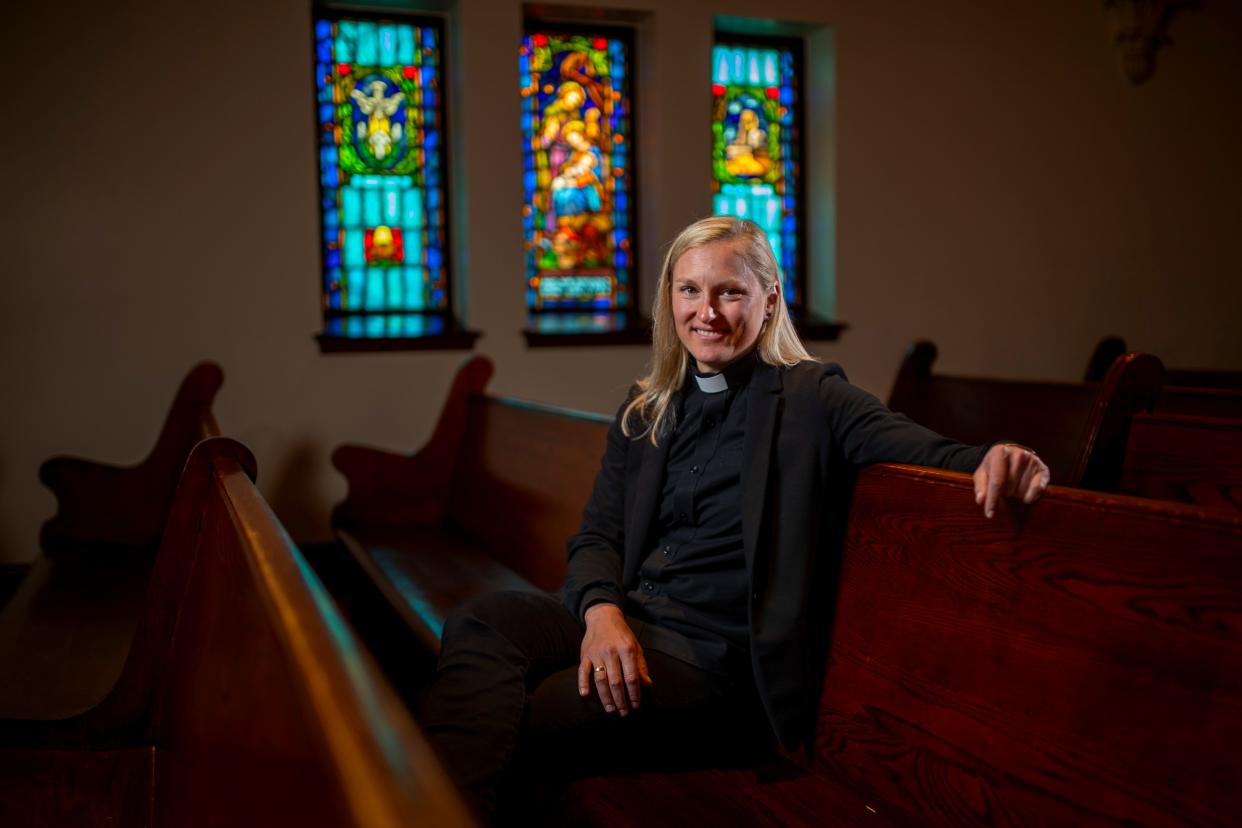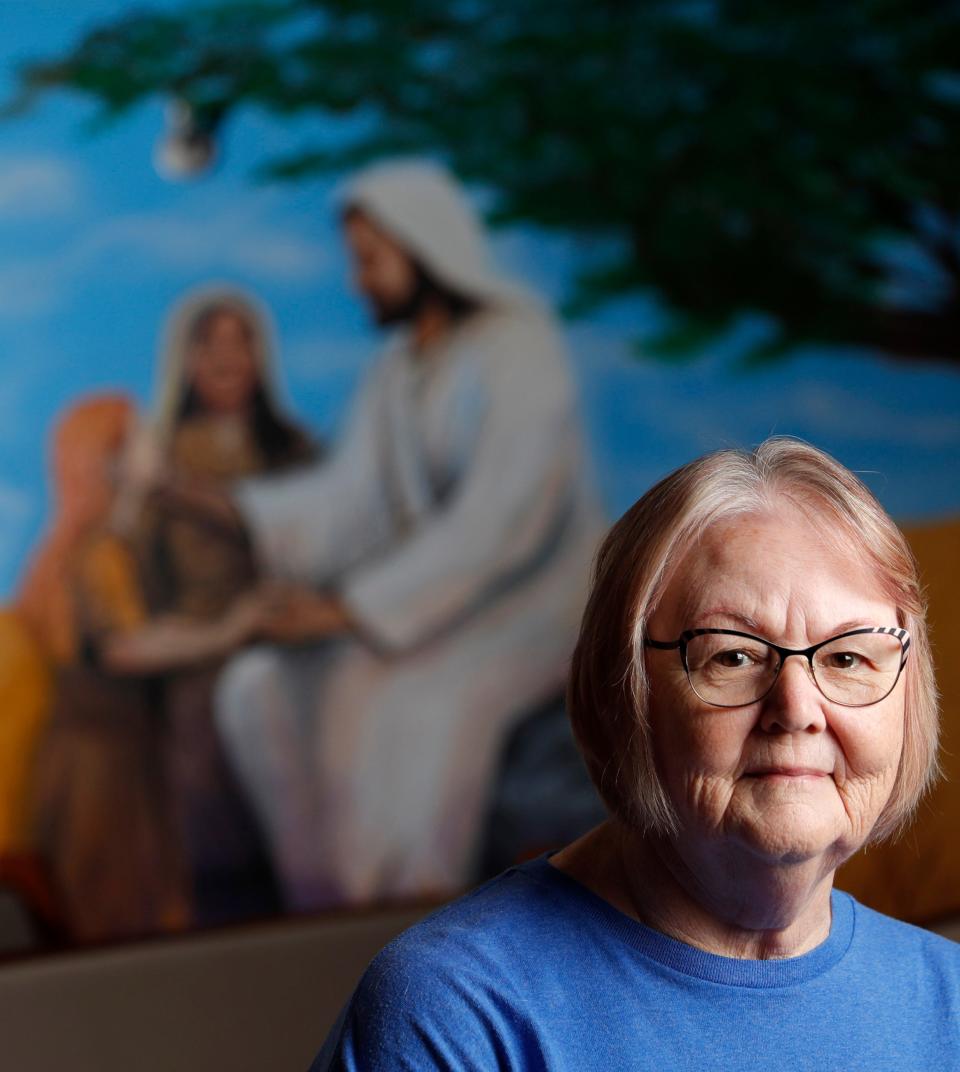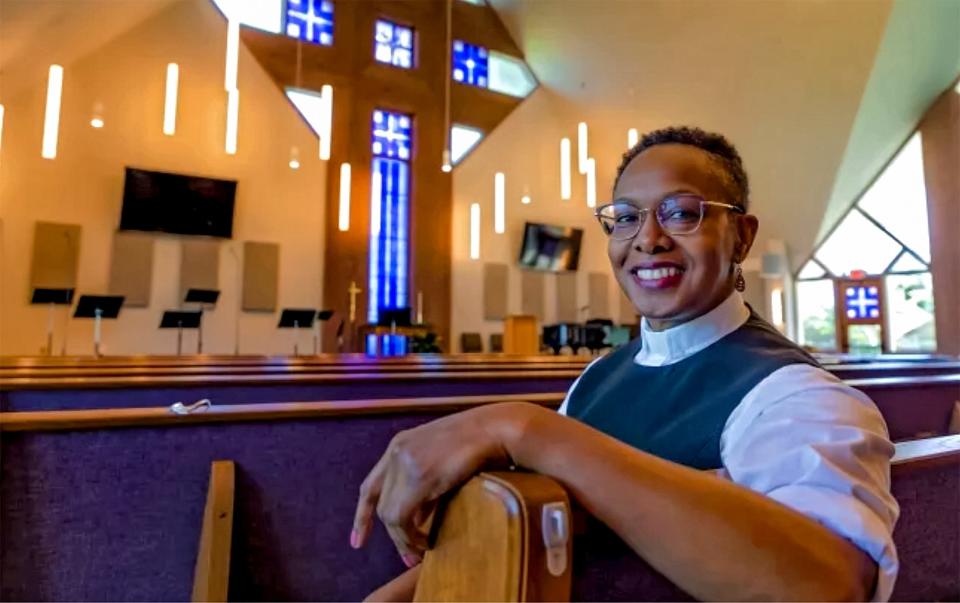'Backbone of the Church.' In wake of Baptist debate, Oklahoma female clergy share stories

- Oops!Something went wrong.Please try again later.
Evangelist Rick Warren's decision to face-off against the Southern Baptist Convention brought attention to the debate over female pastors, but arguments over the spiritual compatibility of women clergy have been going on for decades.
Few people know this better than several Oklahoma women who have taken to the pulpit, including the Rev. Sarah Smith and the Rev. Twila Gibbens, of Tulsa.
Gibbens, 69, grew up as a PK — preacher's kid ― in the 1950s and 1960s and never saw a female pastor preach at the United Methodist churches of her youth.
"There were no role models, and I didn’t imagine being one," she said.
By contrast, Smith, 37, grew up seeing and hearing United Methodist female pastors preach and teach. The female pastors she saw in her youth served as inspiration, along with a female Episcopal priest who served as her mentor at Vanderbilt University.
Currently an associate priest at St. Paul's Episcopal Cathedral in Oklahoma City, Smith said she knows she is doing exactly what the Lord wants her to do.
"Women are the backbone of the Church and our society," she said. "We are the creators and the doers."
Debate on female pastors in SBC: Southern Baptists affirm decision to oust Rick Warren's church over ban on female pastors
Several Oklahoma women recently discussed their journeys to pulpit ministry in the wake of Warren's challenge to the Southern Baptist Convention. In June, Southern Baptist Convention delegates, called messengers, determined that the denomination's credentials and executive committees made the right decision in determining that Warren's Saddleback Church was no longer in "friendly cooperation" with the denomination because the Lake Forest, California, house of worship had ordained women and allowed them to serve as pastors.
The Rev. Lori Walke, senior pastor of Mayflower Congregational Church-United Church of Christ, grew up attending a Southern Baptist church, and she has definite opinions about faith groups who prohibit women from being pastors.
These groups are missing the mark, she said.
"Just as the stained glass ceiling exists for women in the church, the glass ceiling exists for women in leadership in our broader culture," she said. "Sexism and misogyny are rampant, which hold back all of us, not just women. We know that when women and girls thrive, everyone else does, too."
Debate over Scripture is ongoing
The continuing debate about the spiritual compatibility of female pastors typically includes the Bible verse I Timothy 2:9-14, in which the Apostle Paul wrote: "I also want the women to dress modestly, with decency and propriety, adorning themselves, not with elaborate hairstyles or gold or pearls or expensive clothes, but with good deeds, appropriate for women who profess to worship God. A woman should learn in quietness and full submission. I do not permit a woman to teach or to assume authority over a man; she must be quiet. For Adam was formed first, then Eve. And Adam was not the one deceived; it was the woman who was deceived and became a sinner."
The Bible verses found in 1 Corinthians 14:33-36 also are brought up by people who don't believe women should be clergy: "For God is not a God of disorder but of peace — as in all the congregations of the Lord’s people. Women should remain silent in the churches. They are not allowed to speak, but must be in submission, as the law says. If they want to inquire about something, they should ask their own husbands at home; for it is disgraceful for a woman to speak in the church."
Interpretation of Scripture is key, said several female members of clergy who recently talked about their paths to the pulpit. The Rev. Jane Williams, an Assemblies of God minister who attends Revive Church in Edmond, said the 1 Corinthians scripture about women being silent in the church should be placed in context to the culture of the times that it was written.
Williams, 72 said she's always thinks of another scripture, Galatians 3:28, when she learns that someone is questioning whether women are going against Bible teaching by becoming pastors: "There is neither Jew nor Gentile, neither slave nor free, nor is there male and female, for you are all one in Christ Jesus."
And this Bible passage, Williams noted, was also written by Paul.
Also, she said it was a woman, Mary Magdalene, who told Jesus' disciples that he had risen from the dead.
"She took a message, as an evangelist of the gospel that Jesus had preached and she taught that it had actually happened. She took that message to the men," Williams said. "So, whether you're an evangelist or you're pastor or you're a teacher, it should make no difference whether you're male or female. According to Paul, it should make no difference."

Smith said different interpretations of the Bible makes it more likely that the debate over female pastors will continue.
"Everyone has different priorities and biases when reading the text, so it makes sense to me that this conversation keeps happening because some people believe the text is saying only men should be clergy and some folks don't," she said.
"You can argue the text either way, but I think it depends on our values and what we believe Jesus was up to when he was with us for how we ought to think about these questions. Either way, I guess if folks want to be a part of a tradition that keeps women out of power than they should be able to choose that.
She said the ability to make this choice is "the American way — freedom of religion, freedom to choose."
Pastor's daughter becomes a pastor
Gibbens remembers her preacher father quoting Scripture to her when she told him she would be fulfilling her call to the ministry.
She said the ordained ministry board of the Oklahoma United Methodist Church encouraged her to pursueministry, but her father was initially unsupportive. Gibbens said he quoted the Book of Ruth while arguing thatwomen should follow their husbands: "Whither thou goest, I shall go."
She said she was not cowed.
"I said, 'Dad, if you want sharp young men in the ministry, they are going to marry sharp young women," Gibbens said.
Gibbens was ordained in 1981 and went on to pastor several churches in North Texas and Oklahoma. She retired after 35 years in pastoral ministry, and she said she's glad she didn't allow naysayers to keep her from her pastoral call.
More: Southern Baptists give task force another year to implement sex abuse reforms
"My second-year Latin teacher told our (high school) class in 1969 that none of us needed to pursue Latin in high school unless we were going to be doctors, lawyers or priests, so none of us girls needed to take more — and I didn’t think twice about this limitation," she said.
Later, when she was one of several women who began their first appointments as pastors of small churches orassistants at larger churches, she was met with mixed reactions.
"Some of the messages I heard from men were 'I enjoyed your "message,"' not 'sermon.' 'It wasn’t too emotional' and 'Just wear dark hose and lipstick and you’ll do fine,'” Gibbens said.
And it wasn't just men who had difficulty accepting the female pastors in their midst.
"The third time I was pregnant, some of the women of that same church told me I couldn’t be their preacher and have children. (But) I was already doing that, with my husband fully involved in raising the children with me," she said.
The church members who didn't want to accept her ended up sparking a wave of acceptance among those who were more open minded.
"Their lack of support brought out a reaction of other church members surrounding me with encouragement and support," Gibbens said.
Leaving one denomination for another
Both Walke and the Rev. Valerie Jones-Steele, pastor of Quail Springs United Methodist Church, said they had to leave the denominations they grew up in to fulfill their call to ministry. Jones-Steele, who is African American, said she grew up in the predominantly African American Black National Baptist Inc. denomination, which did not ordain women as pastors or preachers.
"I received my calling to preach early but denied it because I was taught in church that women weren’t to preach or pastor and that that decision was preordained by God," she said. "Needless to say, God never ceased from calling me to ordained ministry, and at age 28, I finally accepted the call and left the National Baptist Inc. denomination."

Jones-Steele, 53, found a way forward through the United Methodist Church. By the time the United Methodist denomination ordained her as a minister, she was 39 and ready to fulfill the leadership role to which she felt the Lord called her.
Meanwhile, Walke said she's grateful to have been raised by the people of Blue Lakes Southern Baptist Church, who she described as loving. She said they raised her to be a pastor in spite of the Southern Baptist Convention's theology.
"They taught me to love Scripture, serve God and build the beloved community," she said. "Faith formation at home, and combined with the guidance of my Sunday school teachers, training union teachers, vacation Bible school volunteers and pastors, are a significant part of why I decided to become a minister even though the denomination of my youth doesn't believe women should be pastors."
Walke earned her juris doctorate from Oklahoma City University's School of Law in 2009 and passed the Oklahoma Bar exam that same year. After earning her master's of divinity from Phillips Theological Seminary, she was ordained in the United Church of Christ in 2012.
"God called me, and they (childhood church congregation) cultivated the gifts and graces I needed for preaching, teaching and pastoring."
Inspired by mentors
The Episcopal Diocese of Oklahoma ordained Smith in June 2022 at St. Paul's Episcopal Cathedral in downtown Oklahoma City.
She said she knew she definitely knew she would follow her calling to the ministry after helping people experiencing homelessness as a volunteer for a nonprofit. She said she was in graduate school at the time and the Rev. Becca Stevens was her mentor. Stevens is an Episcopal priest who serves as longtime chaplain at St. Augustine's Chapel on Vanderbilt's campus. She's also founder of Thistle Farms, a network of residential programs designed to aid women survivors of trafficking and addiction.
"I was amazed at how she was able to do so much as a priest to literally change the world and help women get off the streets and rehabilitate into a healthy life," Smith said of Stevens.
Meanwhile, Williams said she lived in California as a teenager and her aunt took her to Assemblies of God revivals, worship services and kids' crusades on a consistent basis. It was at these services that she met a female evangelist named Velma Lackey who showed her that women could preach and teach.
"I think her ministry influenced me a lot, because she was would spend hours studying the Bible and I got that habit from her," Williams said.
Lackey often taught young people at the church to study scripture and she encouraged them to talk about what they studied in front of groups of their peers. Williams said many young men and women were called to the ministry under Lackey's leadership. She said it didn't surprise her when Lackey eventually became the pastor of a church and the majority of the congregation accepted her. She said one couple continued to attend the church after Lackey became pastor but every year when the pastor asked the congregation for a vote of confidence, the husband and wife said they could not give her their vote.
"They loved her, they supported her but she would call for a vote every year and they never voted for her, not one time, and it because she was a woman and they didn't believe that women should be pastors," Williams said. "I never understand that at all."
Williams became a licensed pastor in her 40s, when she and her husband Larry moved their family to Oklahoma. Over the years, Assemblies of God pastors have asked her to preach at their churches while they were away or for special activities and she officiates at weddings and funerals.
"I do believe when you're an anointed pastor, and you have love and care for the people of your church, it's not going to matter if you have a woman come and minister or if you are woman and you're ministering," the Guthrie resident said.
"Everybody has a place in the family of God."
Debate has cultural relevance
Jones-Steele and Walke said the male/female pastor debate strikes at the heart of cultural shifts in American society.
"There is a desire to roll back the rights of many groups, particularly those parts of protected classes, to a time pre-Civil Rights era," Jones-Steele said. "As an African American woman, it is not lost on me that these rollbacks appear to hearken to a time as 'All in the Family's' (1970s TV sitcom) bigoted patriarch crooned in the opening theme song, 'Those were the days.' There is so much irony wrapped inside those lyrics."
She said humans miss the point and don't deal with real problems like homelessness, hunger, injustices, human exploitation, ecological devastation and sexual abuse.
"Women are not that far away from having their credit cards listed under their husband’s name prefixed with 'Mrs.’ Women are not that far away in history from being one of very few doctors, lawyers, corporate heads and faculty in once male-dominated careers," she said.
More: First Bapt-OKC has female pastor A female Baptist pastor in Oklahoma talks about living history
"History bears witness many times of when those treated as subordinate begin to rise, those considered dominant seek ever greater restraints to hold the subordinate down by any means necessary. This mindset is in the culture. This is wherever humanity finds itself with perceived power. Unfortunately, it is even in the Church."
Walke shared similar comments.
She said she's hopeful that bans against female clergy will eventually become a thing of the past.
"As we move towards gender equity in the church and in the broader culture, we will see abundant life for all," Walke said.
For her part, Gibbens said she didn't think the debate over female clergy would still be going on in 2023. She said there are many more women serving as clergy these days and they have "decades of role models," yet she still hears comments that are similar to those she heard as a young female pastor.
"When I entered ministry in 1981, I thought, '20 years from now this will not be new. By then, surely Catholics will have women priests!," Gibbens said.
"But what I know now is that change is slow. Women and people of color in leadership roles is still 'new.' In my experience, people are OK with a few women and people of color with power — but not more than a few. Not half.Not the majority. Societal change is very slow."
This article originally appeared on Oklahoman: Oklahoma female clergy speak out about their roles in ministry

